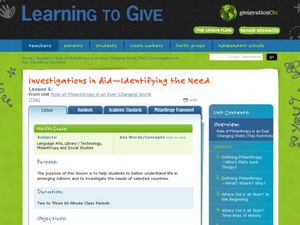School Journalism
Investigative and Data Journalism – Day One
A free press, free to investigate and report on responsibly, compelling stories, is essential to a democracy. A 10-slide presentation details where to get ideas, how to go about an investigation, gather data, and assure the accuracy of...
Pulitzer Center
The Paradise Papers: A Lesson in Investigative Journalism
The Paradise Papers, a year-long research project from the International Consortium of Investigative Journalism (ICIJ) exposed how political leaders, business people, and wealthy individuals used offshore entities to avoid taxes and hide...
School Journalism
Investigative and Data Journalism – Day Two
Class members use the Investigative Reporting Article Planner they completed the first day of the unit to guide the development of an infographic that displays what they have learned about the topic they researched.
Curated OER
Investigating Our Past: Where Did Humans Come From?
Investigate the theories of human evolution. In this research based lesson, learners research and discuss how geographic isolation, interbreeding, generalization, and specialization are factors in the history of humans. Groups work...
Curated OER
Hometown Travel Journalism
Steinbeck’s witty memoir, “Travels with Charley: In Search of America,” inspires kids to investigate their neighborhoods as local travel journalists.
EngageNY
Grade 9 ELA Module 3, Unit 1, Lesson 6
Are cattle prods beneficial for herding cattle, or do they cause more harm than good? Investigate Temple Grandin's claim about animal behavior with a lesson plan that focuses on pages 20-23 of the first chapter of her book, Animals in...
Curated OER
Investigative Journalism
Students choose newsworthy topics to research and investigate, narrow focus of investigation, get information from the source through interviews, write stories, and submit to media outlets.
Curated OER
Investigating Factors That Affect Rate of Enzyme Action
Students explore the properties of enzymes. In this chemical reaction lesson plan, students explore enzymes through a Web-quest and investigative study. Students will collect and summarize data and create a class presentation. This...
Teaching Tolerance
Journalism for Justice
Roll the presses! Or at least have your class members participate in the time-honored tradition of the student press by creating their own newspapers or journalist pieces on a social problem. After conducting research and collaborating...
Newseum
Reporting Part II: Beyond the Basics
Scholars examine the articles written for the series' first lesson plan and select ones that would benefit from further research. In a 48-hour deadline, teams of three select one topic to investigate in greater depth and craft a revised...
Curated OER
Investigative Reporting: Module 3 'On Assignment'
Learners choose and create an investigative journalism piece. In this journalism writing lesson, students work in groups to develop and investigative television show. The end result is for learners to create a video with a 40 minute run...
Curated OER
Investigations in Aid: Identifying the Need
Students investigate the needs in emerging nations. In this emerging nations lesson, students research the conditions for needs in the given countries. Students are assigned to the country groups of Honduras, Nigeria, Bosnia, Cambodia,...
Curated OER
Defining the Difference Between Prokaryotic and Eukaryotic Cells
Learners examine microscopic life by conducting a scientific investigation. In this cell analysis lesson, students define the prokaryotic and eukaryotic cells and discuss their word origins. Learners view each type of cell on slides...
Curated OER
Can I Get A Witness?
Students consider difficulties involved in students testifying in criminal trials. Through first-hand experience in the position of either a witness to a crime or an investigator, students explain how various factors shape a person's...
Curated OER
The Crittenden Conway Duel
Young scholars explore primary and secondary sources. In this primary and secondary source activity, students investigate a crime scene. Young scholars search for evidence around the classroom and evaluate their findings. Students write...
National Endowment for the Humanities
The House Un-American Activities Committee
Was the House Un-American Activities Committee justified in investigating subversive influences in the entertainment industry? Part two of the three-part series of lessons that examine the anti-communism movement after World War II,...
American Documentary
The Benefits and Drawbacks of Plea Bargains
The outcome of 90 percent of criminal cases in the US is determined by plea bargains. Clips from the documentary Better This World create the backdrop for an investigation of the benefits and drawbacks of the plea bargaining process....
Curated OER
Meet The Artist
Students investigate art history by researching a particular artist. In this biographical lesson, students are given a brief summary of a artist's life and are assigned to create a report on the person. Students create an outline based...
Curated OER
Diving into Iceland's Genetic Pool
Investigate ethical issues surrounding the Decode project in Iceland. Middle and high schoolers take the positions of the Icelandic government, scientific researchers, and citizens and defend or refute the Decode project in a Reykjavik...
Curated OER
Is That a Fact?
Investigate popular scientific claims and gather evidence to defend or argue against an author's stance. Writers synthesize information and compose their own "Really?" columns modeled after those found in the weekly "Science Times"...
Curated OER
Hic-Hic-Hooray!
What is really the best way to get rid of hiccups? Investigate some old wives' tales and folk remedies related to health. Middle schoolers explore the science behind why people might believe these myths to be true and find the real...
Curated OER
Edward R. Murrow: This Reporter
What would Edward R. Murrow think of today’s news broadcasts? Learners examine the work of the first public television newscaster and his commitment to researched, accurate reporting. The eight-day study concludes with investigators...
Curated OER
Journalism: Technology and Teen Abuse
Students investigate the link between technology and abuse among teens. They research dating abuse when cell phones or the Internet are involved. Working as a team of reporters, photographers, graphic artists, and page designers, they...
Curated OER
What's Down There?
Investigate the coral reefs around Mokolai Island, Hawaii by researching and writing about improving the reef ecosystem. Learners map threats to the ecosystem and use the list of key words to assist in their descriptions
Other popular searches
- Crime Scene Investigation
- Mathematical Investigations
- Scientific Investigations
- Science Investigations
- Detective Investigation
- Criminal Investigation
- Dead Sea Investigation
- Field Investigations
- Career Investigation
- Crime Investigation
- Hands on Investigations
- Internet Investigation

























